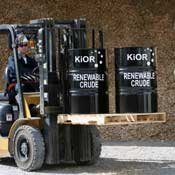A high number of job openings in "green jobs" such as renewable energy and recycling means many opportunities for employment exist in green industries, according to a recent study. Although the number of jobs in environmentally friendly industries is rising in Mississippi, employers may be having trouble finding workers with the skills they need.
The Mississippi Department of Employment Security released findings from a survey on "greening Mississippi's economy" at a conference Sept. 29. The survey looked in part at the number of workers who spend more than half their time working in categories such as renewable energy, pollution reduction, recycling and conservation.
Dek Terrell, director of Louisiana State University's Division of Economic Development, worked on the study.
"One of the things that you see is a gradual greening of the economy, both in Mississippi and the U.S. as a whole," Terrell said. "... When I look out over a period of 30 to 40 years, the idea of 'green' is not a fad."
The number of "green jobs" in Mississippi will grow by 18.5 percent over the next 10 years and add 9,000 new jobs to the state, if the study is correct. Mississippi's overall employment is expected to grow 12 percent during that time.
Officials from Mississippi and Louisiana partnered to survey businesses about green jobs last year as part of a grant from the U.S. Department of Labor. About 20 other agencies conducted similar surveys. Terrell said the survey should provide a baseline for understanding how much the green economy impacts employment, as well as studying the potential for job growth and what skills employers need in new hires.
Government policy alone does not make the green economy grow, Terrell said. As people in a society overall get wealthier, they typically devote a greater percentage of the economy to improving the environment and their quality of life. New technology and innovations also reduce the cost of "going green."
Terrell said that the percentage of Mississippi jobs in renewable energy was significantly higher than in Louisiana. Mississippi also has a leg up on the biofuels industry because of its natural resources, Terrell said, making the state competitive in the renewable energy market.
"One of the great pieces of news for Mississippi from this is that Mississippi is not running 50th in (renewable energy)," he said.
Sumesh Arora, director of Strategic Biomass Solutions, attended the conference and said the study is helpful in showing how strong the green jobs sector is in Mississippi.
"It may not be large percentage-wise, but it's comparable to other states," he said. "Mississippi really is leading the charge when it comes to attracting new renewable energy companies."
Strategic Biomass Solutions is a program of the Mississippi Technology Alliance, a nonprofit organization. The program provides resources and training for entrepreneurs, new renewable energy companies, economic developers and investors.
Arora said he is looking forward to analyzing the data from the study to use in some of the program's reports.
At the time of the survey, the vacancy rate for green jobs was 6.9 percent, with more than 1,000 job openings—much higher than the typical rate, which is about 2 percent. Terrell said the highest job vacancy rate ever observed in a state as a whole was 6.5 percent in Louisiana after Hurricane Katrina.
Mary Allen, work force coordinator for the Central Mississippi Planning and Development District, which includes Hinds County, said workers in the area need more training and education to fill prospective employers' needs. Allen said work-force development and economic development must work hand-in-hand.
"Once we have identified those occupations and industries that we need to focus on ... we can bring the community college system into play and work together to provide the training that we need," she said.
Allen's agency offers programs to fund on-the-job training and community college classes, among others, through the WIN job centers.
MDES has also released a website with more detailed findings from the study about the green jobs market in Mississippi, as well as how much the study predicts various green industries and jobs will grow over the next 10 years. The website also has listings of green jobs and resources for finding training for the green jobs sector. Visit the Mississippi Green Jobs website at http://greenjobs.mdes.ms.gov.



Comments
Use the comment form below to begin a discussion about this content.